
Dan Feidt's log on Minnesota, Information Operations, spinstorms and latent contradictions.
The test of the Zionist left. By Yossi Beilin (Haaretz)
There are those who expect the Zionist left to join in the revelry of war, in the pathetic slogans such as "We will win" and in the fiery comments such as "Nasrallah will remember who Amir Peretz is."
There are those who expect us to join the non-Zionist left, which is calling for a unilateral cease-fire, accuses Israel of war crimes, demands that Hamas and Hezbollah be given what they want, and opposes all use of force. Both sides say this is the test of the Zionist left - and they are right.
We have a deep belief in the right of the Jewish people to a democratic and secure state, which has a stable Jewish majority: the state of the Jewish people and all of its citizens. We are convinced our national interest is in completing the moves toward peace with the Palestinians, Syria and Lebanon, and that there is no alternative to an agreement.
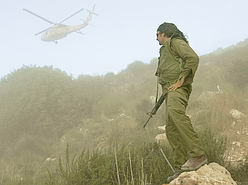 I am not gonna feel like writing tomorrow, so it's either now or the weekend. Here are a lot of bits from the past couple weeks in the Lebanon-Israel conflict. The window after the first two weeks was Israel's chance to capture the initiative against Hezbollah and attempt to achieve their hazily articulated goals in this vicious little war. It's a big war, but the space is very small.
I am not gonna feel like writing tomorrow, so it's either now or the weekend. Here are a lot of bits from the past couple weeks in the Lebanon-Israel conflict. The window after the first two weeks was Israel's chance to capture the initiative against Hezbollah and attempt to achieve their hazily articulated goals in this vicious little war. It's a big war, but the space is very small.
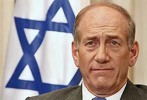 Escalations for the weekend: Haaretz: Security cabinet okays decision to expand ground operation in Lebanon:
Escalations for the weekend: Haaretz: Security cabinet okays decision to expand ground operation in Lebanon:
.......PM wavered on expansion decision
Olmert was hesitant prior to the meeting on whether to approve the proposed expansion of the IDF ground operation in south Lebanon.
Olmert was concerned that the plan presented by the defense establishment would result in hundreds of casualties, and therefore, wanted to subject it to a careful cost-benefit analysis. In Tuesday's fighting in Lebanon five soldiers were killed and 23 others wounded, two of them seriously. According to a government source, Olmert had also asked the army to present him with several different options for a ground operation.
A decision to send troops deeper into Lebanon is fraught with considerable risk. In doing so, Israel could set itself up for new criticism that it is sabotaging diplomatic efforts. Also, a wider ground offensive might do little to stop Hezbollah rocket fire on Israel, while sharply increasing the number of casualties among Israeli troops.
While most of the cabinet was expected earlier to back whatever Olmert decides, sources in the Prime Minister's Office said that three to four ministers were likely to oppose a large-scale ground operation regardless of Olmert's position. The IDF's proposal was for a two-week ground operation that would involve conquering the entire area south of the Litani River, and even a few areas north of it, in order to reduce Hezbollah's short-range rocket launching capabilities.
IDF Chief of Staff Dan Halutz said Tuesday that such an operation was necessary "in order to end this war differently." People who participated in discussions of the plan with him said they had never heard him speak as forcefully in favor of anything as he did in favor of the proposed ground operation. Peretz fully supports the army's plan, which he considers essential for Israel to achieve its diplomatic goals.
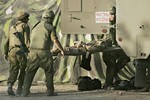 Nine paratroopers killed in attack on home in Dibel; 15 soldiers killed Wednesday in south Lebanon
Nine paratroopers killed in attack on home in Dibel; 15 soldiers killed Wednesday in south Lebanon
By Amos Harel and Eli Ashkenazi, Haaretz Correspondents, and Agencies Last update - 01:59 10/08/2006
Fifteen Israel Defense Forces troops were killed on Wednesday, the IDF announced late Wednesday night, as fierce fighting with Hezbollah guerillas raged in the southern Lebanon villages of Ayta al-Shaab and Debel.
The 15 IDF soldiers were killed in a series of firefights across the front. In the most serious incident, nine reserve paratroopers were killed and 11 wounded by antitank missiles fired on a house in the village of Debel, in the central sector. Four reservists from an armored brigade were killed in a tank explosion, apparently caused by antitank missiles, in the town of Ayta al-Shaab. An infantryman was killed late Wednesday when he was hit by a mortar in Marjayoun.
DEBKAFile: Israeli official spokesman say deep ground push into Lebanon approved Wednesday to reduce rocket attacks is put on hold for 48 hours to give more time for diplomacy August 10, 2006, 9:26 AM (GMT+02:00)
DEBKAfile adds: On the ground, the first troop and tank elements of the advance began moving Wednesday overnight and are continuing Thursday, Aug. 10.
The decision Wednesday, Aug. 9, by 9 votes, none against and 3 abstentions, includes areas up to the Nabatea plateau and Arnoun beyond the Litani River. The objectof the extension is to reach and eliminate Hizballah's rocket-launch centers. It deepens Israel's thrust to some 45 km from the border and calls for a further large influx of army reserves.
DEBKAfile’s military sources add the extended operation does not promise the total stoppage of all rocket fire against Israel, but could potentially bring about a sizeable reduction from up to 200 a day to some 30 or 50.
Also: The stakes of the Lebanon War have shot up with the expansion of the Israeli offensive up to the Litani and Nasrallah’s rejection of diplomacy in favor of battle
Israel's military of old was specialized in quick, mechanized warfare. As they settled into the occupied territories, despite all the heavy weapons, the IDF reoriented itself to battling Palestinians, typically armed with rifles, handguns or machine guns. The Palestinians have some rocket-propelled grenades, as well, but they lack advanced infantry weapons. So the IDF has phased away from preparing for war with real infantries, and instead play supercop on the hapless residents of the West Bank.
They really thought that Hezbollah was only as "thick" as HAMAS, I guess. The Israelis went storming in without realizing that Hezbollah had lots of anti-tank missiles - on rocky terrain that doesn't give a lot of space for tanks. The IDF doctrine failed in the face of a new kind of conflict.
Right now we are watching a turning point in the nature of warfare. Everything from pack mules to to hacking to encrypted satellite feeds fits into fourth-generation warfare (pdf). Sub-state actors will basically be able to fight a top-notch modern army.
ANALYSIS: IDF still not in control of strip along Lebanon's border By Ze'ev Schiff, Haaretz Correspondent 08:57 10/08/2006
The large number and the location of the casualties that the Israel Defense Forces sustained Wednesday indicate that the army does not yet control the narrow strip along the border, although this stage of the ground operation was supposed to have been completed already.
The two battles also reveal a great deal about Hezbollah's method of fighting. They took place in two relatively small communities, Ayta al-Shab and Debel, close to the international border, on territory that until May 2000 was in Israel's Security Zone.
The ground operation, dubbed "Change of Direction 8," was intended to conquer this border strip. First it was to be a two- to three-kilometer strip. Then it was expanded to five to six kilometers, including numerous Lebanese villages and towns. The mission was to blow up all Hezbollah's outposts in this strip and drive its forces out.
What happened in Bint Jbail recurred in Ayta al-Shab. Although it seemed that the town had been conquered, it transpired again and again that there were still Hezbollah men in it. Once again, clashes and battles took place, and again, the IDF suffered dead and wounded. Although the army had conquered the town, Hezbollah men were hiding in underground bunkers well camouflaged from the outside. The bunkers had been stocked with large quantities of food, enough to last for weeks, and ammunition, including antitank missiles and, in several cases, short-range rockets.
The bunkers are connected to electricity and, according to one report, are air conditioned. When the fighting dies down, Hezbollah fighters emerge from the bunkers and set up ambushes for IDF soldiers and armored vehicles. That is why soldiers are hit repeatedly in the same places.
On several occasions, there have been difficulties evacuating wounded soldiers under fire. At times, Hezbollah fighters have fired rockets at Israel from areas close to the border that the IDF had supposedly conquered already. The means available to flush the guerrillas out of their underground shelters are not always employed.
Senior officers have suggested, inter alia, that the army bombard these towns heavily and even destroy them. But in any case, a decision has been made not to reenter them at this stage. The IDF could forge ahead, as it has done in the last two days in the Marjayoun area. But even after such an incursion, Hezbollah fighters who remain in the bunkers could continue launching rockets. In other words, they could fire toward Israel from behind the lines of IDF forces that have progressed deep into Lebanon. It is clear that the Hezbollah men who stayed behind are equipped with two-way radios and receive information from scouts hiding near the border. This explains the difficulties in managing the fighting in south Lebanon, which the IDF has not encountered before.
Even if Hezbollah "loses", the writing is on the wall. In the 21st century "the State" itself is weakening. Sub-national organizations like Hezbollah, with economic, military, political, social, educational, medical (and often spiritual) branches are displacing the State.
One should remember that the Middle East's artificial European-drawn boundaries have left many overlapping ethnic groups. The Pashtuns now at the core of the Taliban straddle Afghanistan/Pakistan. The Kurds are organized a bit like Hezbollah, and the ruthless pursuit of the Kurds' interests has rewarded them well since the US toppled Saddam. But they too are divided between parties that ruthlessly fight each other.
In Syria, only a few dozen miles east of Israel's bombing campaign lie many major Arab Sunni tribes like the Dulaimis, who especially live in cities along the river into Iraq, where their cousins' tribes live, sparring with Kurds and Shiites.
In this kind of region, everyday people are going to direct their primary loyalties towards sub-national groups that they believe represent their interests. By the early 1990s, Hezbollah, which the Iranians helped create by binding together different Lebanese Shiites, was seen as something of a successful model – social, political, military: robustly structured to resist political pressure, infiltration and military assaults from the Israelis and others.
Before Saddam fell, The Iranians used the Lebanese sub-state model inside Iraq, to lay the framework for the Shiite rise to power. Very quickly, SCIRI, Muqtada Sadr's people, and the Dawa Party all had organized cadres of armed guys, but more importantly, social services and methods for trying to restore any sense of law and order shattered with the US invasion. If the guys on the block with guns keep the thieves away, then they are pretty much your state, even if they don't report to Baghdad.
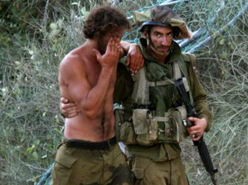 The news in Israel right now is that 15 reservists got killed in Lebanon, with heavy fighting around Bint Jbail, a site the IDF captured and subsequently evacuated. As the maps made clear, Bint Jbail is not more than a few kilometers from the border, yet the Israeli forces, despite all the bombing and everything, have not been able to hold that area, once they reached it and tried to occupy.
The news in Israel right now is that 15 reservists got killed in Lebanon, with heavy fighting around Bint Jbail, a site the IDF captured and subsequently evacuated. As the maps made clear, Bint Jbail is not more than a few kilometers from the border, yet the Israeli forces, despite all the bombing and everything, have not been able to hold that area, once they reached it and tried to occupy.
Reports in the Israeli media indicate that Hezbollah is able to keep attacking in areas the Israelis have already 'captured.' I think it's pretty likely that Hezbollah has drilled tunnels hundreds, if not thousands of meters long, attached to deeply hidden bunkers with all the necessary weapons and supplies. It is an amazing intelligence failure that the Israelis didn't anticipate this, and still, within a very small space the IDF has not been able to block out Hezbollah. The tempo of rocket attacks has not been curtailed in any serious way, and Israeli military analysts don't really think it can be shut down without a wide invasion. Hezbollah is winning the tactical situation by playing very hard-core defense with lots of anti-tank missiles. So far, it's mostly been a successful military strategy.
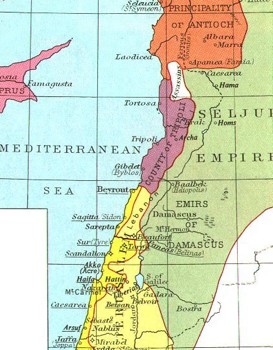 This is in keeping with the local style: in the good old days of the Seljuk Empire (c. 1100), the Hashshashin, or Assassins, would hang out somewhere between Damascus and Antioch - the home of the Holy Hand Grenade. The map's white spot shows a patch of mountainous land where the Assassins held sway. Mountainous redoubts are easier to defend, and such clever methods have migrated about 200 miles south, where nearly a millennia later, some pretty insane shit is going down.
This is in keeping with the local style: in the good old days of the Seljuk Empire (c. 1100), the Hashshashin, or Assassins, would hang out somewhere between Damascus and Antioch - the home of the Holy Hand Grenade. The map's white spot shows a patch of mountainous land where the Assassins held sway. Mountainous redoubts are easier to defend, and such clever methods have migrated about 200 miles south, where nearly a millennia later, some pretty insane shit is going down.
Well then, thats enough rambling background. Here's some damn links.
The rockets keep coming: Hizbollah rockets kill 15 in northern Israel. Hapless reservists. An ugly scene. IDF Raids near Tyre.
Emotional reaction in Israel propels poor policy:
`Peace' is a term not used in the public space in Israel anymore...No one expects any dialogue on a real practical level. The military always offers a shortsighted immediate way out. The wish to identify with the power of the gun and the uniform is still alive in Israeli tribal DNA. Revenge is a word not used in the open; it is there in the undercurrent of the emotions expressed by the public, our bombardment of Gaza had the same motive behind it.
UK Guardian: Israeli pilots 'deliberately miss' targets: Fliers admit aborting raids on civilian targets as concern grows over the reliability of intelligence
You need to give money to AntiWar.com. Their work is important and kinda spooky. Rumors that apocalyptic Christian writers are visiting the White House. Stratfor has free podcasts. Updates on the Tikkun Olam blog (תקון עולם: Make the World a Better Place).
Iranian dimensions:
Haaretz: Nasrallah's dilemma By Amos Harel and Avi Issacharoff
As the war progresses, the depth of Iranian involvement in Hezbollah activity is increasingly being revealed. Hezbollah has established a Tehran-sponsored forward outpost here, under the noses of the Israelis. When the war ends, Iranian soul-searching will include the question as to whether the activity here was not premature: whether the strategic card of the rocket battery was not revealed too early, for the sake of a negligible goal like the release of the four prisoners, instead of saving it for the day of judgment, for the eruption surrounding its nuclear program.
The Iranians are involved up to their necks in Hezbollah activity: Their advisers participated in the firing of the missiles at Israeli ships and in the firing of Strela (SA-7) antiaircraft missiles at Israeli planes and helicopters. During Israel Defense Forces operations in the south, sophisticated listening rooms were discovered, via which the Iranians eavesdropped on Israeli communications and telephone networks, both civilian and military.
Guardian: Bloody night in Beirut as Israel intensifies aerial bombardment: IDF warns UN troops will be attacked if they repair bridges (aug 8)
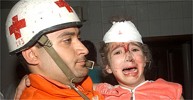 Information warfare sector: Olmert meets with spokespeople to sharpen PR message. PrisonPlanet says: Another Israeli Myth Exposed: There Were No Hezbollah Rockets In Qana but Israeli media alleges Qana killing was staged, dubbing this pattern Hezbollywood. With a certain sense of weird horror, Haaretz features "Where there's smoke, there's liars": "1. The Muslim Lie Mode, or The Dead as Visual Aid (When Arabs report what Israel has done) 2. The Israeli Lie Mode, or The Dead as Enemy Weapon (When Israelis report what Israel has done). 3. The American Lie Mode, or The Dead as Nonexistent." Anyway, Half of U.S. Still Believes Iraq Had WMD.
Information warfare sector: Olmert meets with spokespeople to sharpen PR message. PrisonPlanet says: Another Israeli Myth Exposed: There Were No Hezbollah Rockets In Qana but Israeli media alleges Qana killing was staged, dubbing this pattern Hezbollywood. With a certain sense of weird horror, Haaretz features "Where there's smoke, there's liars": "1. The Muslim Lie Mode, or The Dead as Visual Aid (When Arabs report what Israel has done) 2. The Israeli Lie Mode, or The Dead as Enemy Weapon (When Israelis report what Israel has done). 3. The American Lie Mode, or The Dead as Nonexistent." Anyway, Half of U.S. Still Believes Iraq Had WMD.
The US-Israeli link: this looks at Condi and an IDF spokesperson as two flipsides: Between two friends by Tom Segev:
During the past 39 years since the Six-Day War, the United States did not force Israel to pull out of the West Bank, but more than once acted to block Israeli military actions. Over time, we have grown accustomed to the Americans saving us, not only from the Arabs, but from ourselves too. Not in this war. It is still unclear whether this war was coordinated with the United States; only the release of government records of the past three weeks will shed light on this. Whatever the case may be, the impression is that the Americans are linking the events in Lebanon to their failing adventure in Iraq.
Israel's elites, in all fields, are made up of people who spent a number of years in the United States and returned with not only professional skills but also an appreciation for the value of the individual and basic freedoms. For the most part, this was a useful process, even though it did contribute to a fading of social compassion. This process of Americanization has led Israel in recent years to covet a role in what Bush has described as a war on the "axis of evil."
As such, Israel has adopted the moral values of Hezbollah: Whatever they are doing to the residents of northern Israel, we can also do to the citizens of Lebanon, and even more. Many Israelis tended to look at the Qana incident primarily as a media disaster and not as something that imposed on them any ethical responsibility. After all, the restrictions of humanitarian warfare are not applicable to the "axis of evil." Just like in Iraq, the lessons of Vietnam have been forgotten. It is hard to avoid the impression that the routine brutality of oppression in the Gaza Strip and the West Bank is also reflected in the unbearable ease with which Israel has forced out of their homes hundreds of thousands of Lebanese and bombed civilians.
Tense situation with Israel's own Arab population (20%): Border Police search Israeli Arab homes without warrants.
Loss of Momentum by Amir Oren (Haaretz):
The IDF's greatest loss was momentum. The first week of the campaign went reasonably well, borne on the wave of the stunning success of the attack of Hezbollah's long-range rockets. Between the middle of the second week and the middle of the third week the IDF lost a week, not least because of its reaction to the eight Golani Brigade soldiers who were killed in Bint Jbail. That lost week, as the rain of Katyusha rockets continued to fall from on high, undermined the army's self-confidence and thrust it into a posture of public self-defense. It shifted into recovery mode only because of the time it was granted by Washington. Fear of a large number of casualties was the major factor in the government's hesitations, for almost a week, about whether to send more divisions into the fray, entailing a call-up of reserve units.
The General Staff admitted the IDF did not work fast enough. They did not grasp the fact that the context had changed and that this was not just one day of battle or a routine-security incident, but a war, which has its own laws. Commanders who were used to operations in the territories did not internalize the need for speed, persistence and continuity.....
The sweeping criticism did an injustice to Division 91 and to the "hunt" concept in the air force. A colonel in the division said this week that for months the division's senior command "drove officers crazy with alerts to prevent abductions, turned over every stone and laid down new stones in order to turn them over, too." The abduction, the colonel noted, was comparable to a special operation by an IDF commando unit, which, in the absence of precise intelligence, is difficult to thwart even after all the preparations across the sector.
Various people yelling at each other: ADL: Hugo Chavez comparison of IDF and Hitler is Outrageous. Yesha (settler) Rabbinical Council objects to ridicule of Chief IDF Rabbi.
Hawks crow: Win that war! (Haaretz). Peace Index: July 2006 / Support for the war and the IDF holds up.
A final batch: I got nothing left after these Haaretz bits: ANALYSIS: There appears to be a command problem in the north. From war, an opportunity. Snatch a possible victory. Down but not out. Little Satan has big teeth. ANALYSIS: Deployment of Lebanese army may be good for both sides.
Well, that's all for a while. Enjoy.
Posted by HongPong at August 10, 2006 12:57 AM